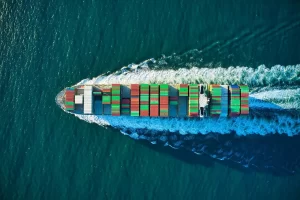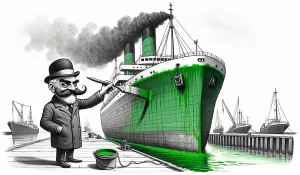One of the oddest words in the maritime lexicon is ‘bunkers’. It is an old word from the coal era that is now used when referring to a variety of maritime fuels, everything from coal to methanol. Is this the right word to use for low- and zero-carbon fuels given its dirty history?
Semantic Shift and Priming
Words are not static, they evolve and adopt new meanings over time. Etymologists refer to this evolution of a word’s meaning as a semantic shift. As an example, nautical phrases from the age of sail like “three sheets to the wind” are still used today but with a very different meaning. The same applies to bunkers.
Words can have subtle and powerful influence over people’s behavior and thoughts. When you hear a word, your brain automatically associates it with other words and actions. By leveraging well known associations between words, human brains can be primed to think in certain ways, as beautifully explained in my favorite book “Thinking Fast and Slow”. For example, think about the words ‘eat’ and ‘noodle’. Now fill in the blank for this missing letter: ‘so__p’.
Did you come-up with ‘soup’ instead of ‘soap’? That’s priming, and it may be impacting our ability to shift away from fossil fuels.
Defining Bunkers
When coal was the dominant form of fuel, it was stored and transported in storage containers called coal bins or coal bunkers. Over the years ‘bunkers’ has undergone a semantic shift and the term morphed into a synonym for coal and then fuel oil. We need to shift away from these fuels, in more ways than one.
Confusingly, the word ‘bunker’ can be a noun, such as “What type of bunker is that?” or it can be a verb, such as, “We will be bunkering in Singapore.” As ships shifted from coal to residual fuel oil and diesel, different types of bunkers emerged. These bunker types are designated by letters which indicate the relative viscosity of the fuel: Bunker A refers to fuel oils like diesel and marine gas oil (least viscous); Bunker C refers to residual fuel oil (the most viscous); and Bunker B is something in-between the two.
As I mentioned, word association and priming is important. Take a look at these definitions of bunker from some of the leading online dictionaries:
- Britannica Dictionary: “a container for holding coal, oil, etc., on a ship or outside a house”
- Meriam-Webster: “to fill a ship’s bunker with coal or oil”
- Collins: “A bunker is a container for coal or other fuel.”
- Macmillan Dictionary: “a small room or large container where you store coal”
- The Free Dictionary: “Fuel, such as coal or fuel oil, used especially in ships.”
After reading these definitions, what words do you most associate with bunkers? I doubt zero-carbon or green fuels are on the list, they didn’t appear in any of the definitions above after all. Should bunkers, a word that is wholly associated with coal, be used to refer to low- and zero-carbon fuels?
Today, bunkers is a catchall referring to any type of marine fuel. Even as the maritime sector shifts to low- and zero-carbon fuels, we continue to use bunkers to refer to fuels like LNG, methanol, ammonia, sustainable biofuels, and hydrogen. See these recent examples from the news: “hydrogen bunkering”, “ammonia bunkers”, “methanol bunker vessel” or “methanol bunkering“. Using bunkers this way may be priming us to think about fossil fuels when we want the opposite.
Change the word, or change the definition?
This is not climate wokeism or postmodernism applied to marine fuels. It’s about resetting our mental associations and unconscious biases. Continued use of ‘bunkers’ in maritime communications may be subconsciously priming us to think about fossil fuels, reinforcing the dominance of fuel oil in shipping and making it harder to transition to new low-emitting fuels.
If we can disrupt the mental heuristic that ‘bunker = coal or fuel oil’, it can make people think holistically about other fuels that are available. How do we disrupt this mental heuristic? There are two approaches.
One method would be to embrace a broadening of bunkers to include new fuels and then over-emphasize the new meaning, forcing a semantic shift. Over time, new associations would be created. Replacing the definitions above in favor of more inclusive descriptions that encompass a broad range of fuels would help. We could also create a new bunker designation, like ‘Bunker Z’ to refer to non-fossil fuel alternatives (where ‘Z’ signifies zero-carbon emissions). However this still keeps us tied to the word bunker and it’s not clear how long it would take to undergo this semantic shift. In the interim, when someone says bunkers, they could be referring to residual fuel oil or clean hydrogen which are clearly not the same.
A different approach could drop the usage of bunkers altogether. Instead of bunkers, it’s zero-carbon fuels or zero-emission fuels (ZEFs); instead of bunkering, it’s refueling (or recharging). We don’t need the word ‘bunkers’, it’s only used today because of historical norms and tradition.
We have gone through the age of coal and the age of fuel oil is coming to a close. Terms of art should evolve to the needs of the sector in which they are used. Bunkers is an archaic term with strong associations to coal and fossil fuels. We need to disrupt these associations by broadening the meaning of bunkers, or dropping its use altogether.




